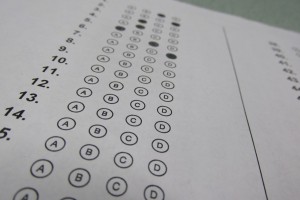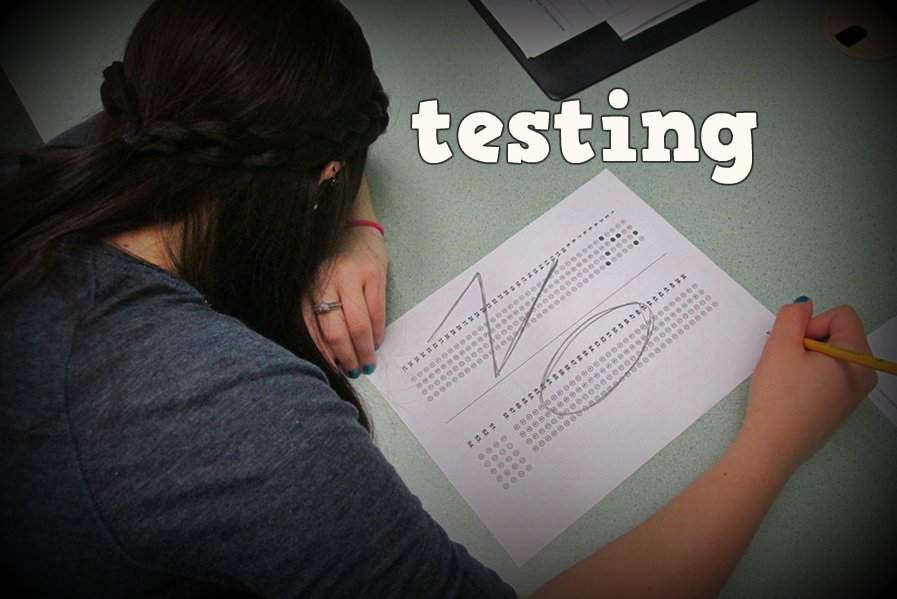Standardized Testing: Yay or Nay?
Standardized testing brings with it pressure, and many students are opting out of the process.
April 17, 2015
What’s the real purpose of going to school? Isn’t it to learn? Isn’t it to study subjects in which we find most interesting? Isn’t it to educate ourselves without the hassle or worrying about having to prove ourselves to anyone? Yes? Then what is the point of standardized testing?
This is the perspective many students, parents, and even teachers have on the subject of standardized tests. These tests are set in place to judge schools and to place them on a chart, grading their score achievements.
Opting out of these tests has become a rising trend in our nation. Parents don’t want their children taking them, teachers don’t want to teach to the test, and students just simply don’t want to take them.
Some parents ave gone as far as to say these standardized tests go against political views and even religious views.
One Bellwood-Antis High School teacher said, “Testing narrowed the curriculum. It now focuses on mostly math and reading and forgets about the sciences and arts.”
People don’t agree that the amount of testing is appropriate and they feel like it’s an invalid representative of a student’s knowledge or school’s skill level.
“If we’re going to use the tests to judge the schools, we’re not really judging the school at all,” the teacher said.
Thirty million dollars are spent each year to fund these tests. Is that too much?
It is possible now that teachers are so worried about “teaching to the test” that they fear straying away from the test’s curriculum. Students are only being taught what the tests want them to know. So the question becomes, is this even fair?
There have been many studies done that prove that 80% of a student’s test score can be predicted based on their social economic status. This is why test scores in the inner city of Pittsburgh tend to be lower than our small-town school of Bellwood-Antis.
“In a high-achieving school, you’ll probably see high economics, and vise versa.”
Kids at the poverty level have other things to worry about most of the time. They don’t do as well on these tests “which is something we’ve known for years.” This teacher said, “It’s not that they can’t learn, it’s just that they have other things to do.”
I know what you’ve probably been asking yourself: how is any of this a religious issue?

Many parents and adults alike envision filling in bubble sheets for hours when they think about standardized tests.
The people who discriminate against the testing for religious reasons say that there is too much focus on the tests instead of on the kids’ education, where it should be. These tests stress the students out and harm the “overall well-being of them, with lack of nurture.”
“It’s not helping kids, but it’s definitely hurting them,” said one teacher on the subject of standardized tests. This view point ranges from all over the social-economic status spectrum. I say this to keep ignorance from making you believe that “only people from the poverty level would think this.”
Bellwood-Antis principal Mr. Schreier believes that standardized tests do give a snap shot to help compare schools across the state or even the nation, depending on the test.
“Standardized testing has been around a very long time. These tests, whether they are necessary or not, have forced our school and others into aligned curriculum. Everyone’s on the same page,” he said.
With all the schools on the same page and all having the same basic curriculum, these tests may actually give a decent reading on a school, in general.
“There has to be structure,” Schreier said, “Teachers can’t always just teach what they want to teach. It doesn’t work that way anymore.”
This “structure” is partly what Schreier calls teaching to the test. He doesn’t totally disagree with this method of teaching. What he doesn’t agree with is when teachers feel compelled to spend the year teaching students how to strategically answer specific questions and how to ensure accuracy.
“It’s wasting time in class to teach how to answer the test correctly,” he said.
The only way to opt out of tests, at this point, is for religious reasons. It’s unclear what these reasons are specifically or if maybe it’s just a way to get out of taking said tests.
There is one thing that you should think about before you jump to the assumption that you can just exclude yourself from these tests.
Keystone testing is soon going to be a graduation requirement. What happens when you opt out of this test? The answer is simple; you do the same thing that the students who fail the Keystones do. It’s called a Project Based Assessment (PBA). This computer project is estimated to take 5-7 hour PER MODULE. What? In conclusion, by opting out of a test, you’re signing up for a longer, more complex extension of the same test. Make sense?
So, what do you think? Should students be forced to take the standardized tests provided for them? Should teachers be forced to teach to a test rather than to the students’ advantage? Would you opt out of these tests? Would your parents encourage it? What about your teachers?
Just something to think about.






